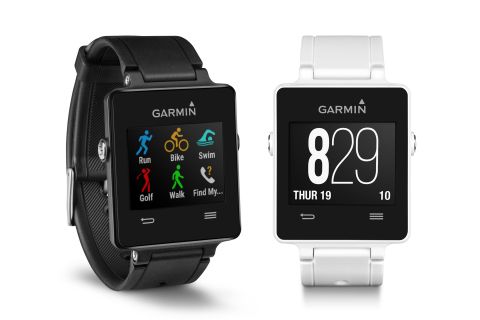Garmin Vivoactive: Perfect Fitness Band For The Golfer In Your Life
Last updated: October 19, 2016
Pros:Waterproof down to 50 meters, GPS is perfect for serious runners, cyclists and golfers, serious support for smartphone notifications and reasonably priced for its abilities
Cons:Boxy and dated design, separate heart rate sensor and battery only lasts 10 hours with GPS activated
Most fitness bands are alright for casual exercise, but bad for any sports. Whether you are training for a marathon or golfing on the weekend, most fitness trackers are unable to provide data that is truly useful for improving your performance. Most fitness bands, like the Fitbit Charge and Jawbone UP series, are not truly waterproof. Most smartwatches lack built-in GPS.
Thanks to its GPS and full-featured smartphone notifications, The Garmin Vivoactive ($249, discounted at most online retailers) would be the perfect compromise between a fitness band and a smartwatch for the sporting type, if it weren't so clunky looking.
While the Vivoactive's watchface is thin compared to many smartwatches, it's boxy shape and rubber wristband make it look dated – like some of the earliest smartwatches from Sony or Pebble.
If you are not looking for a device to wear to the office or out on the town, the Garmin Vivoactive is great. Thanks to its built-in GPS, the Vivoactive can accurately track running, swimming, walking and even cycling, whereas most of its competitors use a less precise motion-detecting accelerometer.
The Vivoactive is also perfect for the golfer in your life. Garmin has a database of roughly 38,000 golf courses that you can download, allowing the Vivoactive to provide yardage to the green as well as dogleg and layup distances. It also includes a stroke counter.
The Vivoactive is a truly smart sports watch, and can count steps and also track your sleep like Jawbone, Fitbitor Withings– but does not do it as well as, nor does it offer as much insight for sleeping and walking. But most athletes are not as interested in that data.
The most glaring omission from the Vivoactive is optical heart rate monitoring. Knowing your heart rate is very important when you are serious about training, and the Garmin Vivoactive requires a separate chest strap.
This is a boon for many, since a chest-strapped heart rate monitor is more accurate than an optical one on your wrist. It also now costs less than the original retail price to purchase the bundle.
The Garmin Vivoactive would be the perfect smart sports watch, but its poor design means you might not want to wear it during your normal day-to-day.
If still interested in learning more about what you need to know before buying a fitness tracker, check out Video: What You Need To Know Before Buying A Fitness Tracker.
